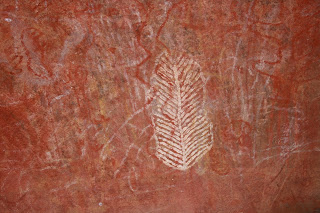Uluru – Ayers
Rock,
After catching
the AAT Kings bus at 7am on Wednesday, March 27, 2013 we left the “Town called
Alice” behind. Our driver John was
very informative and gave an excellent running commentary throughout the
journey. He was also very
entertaining. Our first stop was a
camel farm, where for seven dollars you could ride one of these beasts around
the paddock. We both declined the
invitation, having ridden camels before and not to be repeated unless there is
no other form of transport available.
After talking to some people the day before, we were advised to purchase
fly protectors for our faces, for walking around Uluru. At our next stop we espied the “Fly
Nets” and quickly purchased two, so we were well prepared ahead of time. After a short break we continued our
six-hour plus journey only stopping one more time for a photo opportunity of
Mount Connor.
Arriving at The
Ayers Rock Village we checked into our hotel. This resort, in keeping with its surrounds, was quite
rustic. We had a stroll around the
resort, an early dinner and also an early night to prepare for our hike around
the world’s largest monolith, first thing in the morning. Awakening before dawn we could not
believe that it was RAINING. Not
just raining but torrential rain.
Nevertheless, we caught our bus to The Rock and asked to be dropped off at
the Cultural Centre, where we spent the next hour and a half. The centre was quite amazing with all
kinds of artifacts, paintings, antiques, videos, stories and more. It was very interesting and totally
fascinating. After 90 minutes the
rain was not quite so torrential and we started our trek. It was 2kms from the Cultural Centre,
to the base of Uluru and the trail was totally flooded.. Apparently, less than one percent of
visitors here are privileged to witness waterfalls on the rock. Although we were getting soaked Uluru
was transformed into amazing colours and very fast flowing waterfalls were cascading
down its sides. Some of the
puddles had joined together as small creeks, with no way of crossing without
getting your feet soaked. So we
crossed over, tried to jump but didn’t make it!!!! Anyway what is a little water? We then started our trek around the base from Mala car park
to Kantju Gorge. We were
originally going to do the entire Uluru Base Walk but we were advised that the
other side of the rock was severely flooded. Mala is a rufous hare-wallaby and
the Mala people camped at this site when they arrived at Uluru in the
beginning. The Anangu people are
the traditional landowners of Uluru-Kata Tjuta National Park and the title deed
was returned to them in 1985 and they in turn have leased it back to the
Federal Government for 99 years.
Since 1985 it has been co-managed by the Anangu people and Parks
Australia. Anangu is pronounced
“arn-ang-oo”. We saw Anangu rock
art in the caves and some of the sites that are sacred, photos are not
allowed. The sheer vertical walls
on the way to Kantju Gorge are breathtaking especially with the waterfalls
cascading down. The gorge itself
is profound and a very peaceful place.
It was amazing to watch the water cascading down the rock, straight into
the rock pool below. When it rains
here and the rains subside tiny little frogs emerge, court, breed, lay their
eggs and disappear again until the next rains. We were also lucky enough to see one of these little frogs
calling for a mate. What a thrill. This area is now listed as a World
Heritage Area for both its natural and cultural values. We also saw Spinifex Pigeons here,
which are named after the spiky spinifex grass that grows here in the desert.
There is so
much more to tell of this very special land of the Anangu and throughout this
whole region that it would take forever.
The best way to learn about it is come here, but don’t forget your fly
nets.
It is still
possible to climb Uluru but the Anangu prefer you do not, as it is a sacred
place. It was closed while
we were here, due to the adverse weather conditions. There have been many people who have died trying to climb
it, either from falls or heart attacks.











































































